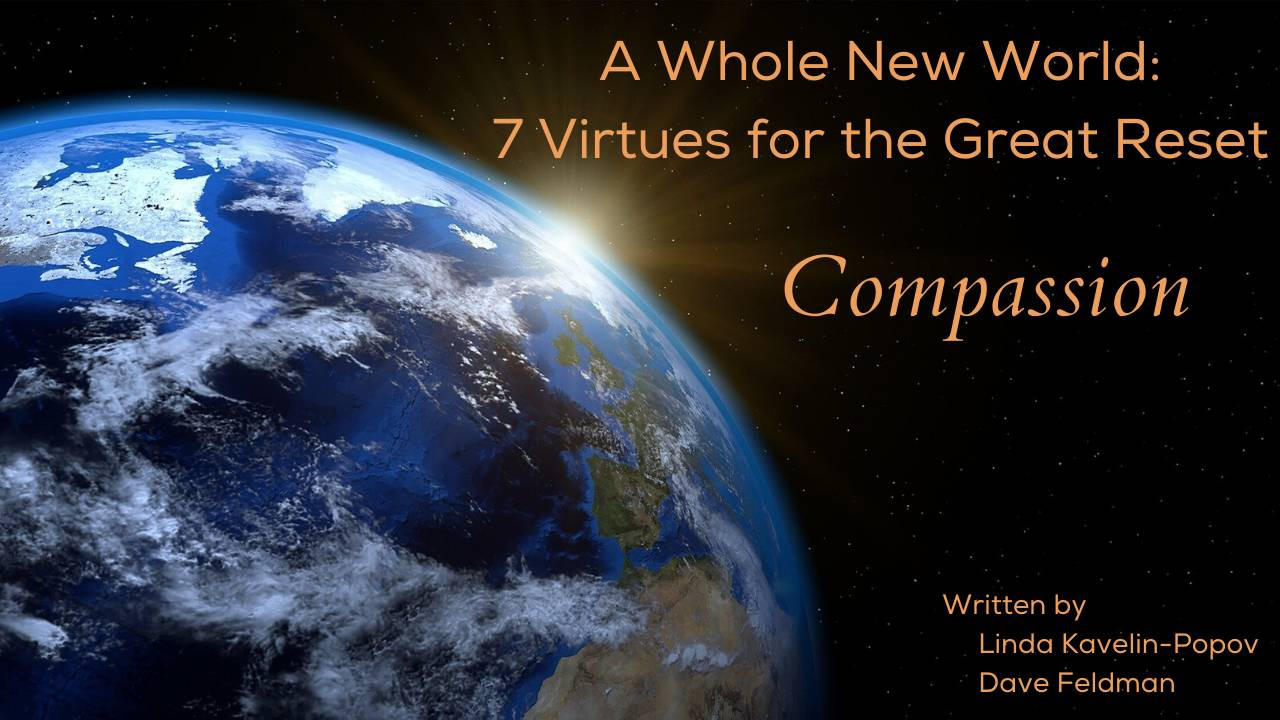
A Whole New World: 7 Virtues for the Great Reset - #5 Compassion
Jul 14, 2020“Be a lamp or a ladder or a lifeboat. Help someone’s soul to heal. Step out of your house like a shepherd.” ~ Jalal’u’din Rumi, Sufi mystic
Whenever there is a rise in human suffering, the need for compassion increases dramatically. We are now, in the midst of a global pandemic, a deepening economic crisis, and for many, heart-breaking awareness of racial injustices perpetrated for generations. Yet, this overwhelming adversity has awakened a massive response of humanitarian compassion within local communities and across the world. Ranked as a primary virtue in numerous philosophies, compassion is considered in all religious traditions as one of the greatest attributes. It is also a remedy for personal fear, worry, and grief. One of the most powerful antidotes to one’s own suffering is to focus on caring for others. Compassion helps us to detach from anxiety, converting that energy into empathy and service.
Many acts of kindness are appearing on social media, such as John Krasinski’s, hugely successful You-Tube show, Some Good News, motivated by compassion for those locked down at home or separated from loved ones in hospital. People in many countries participated by sending in video clips of things as simple as the first physical hug a father was allowed to give his young daughter who underwent chemotherapy, a five year old child sending her baby brother into gales of laughter simply by clapping the pages of a book, and “Code Joy” at a hospital when a Covid patient, given a 1% chance of survival by the doctors, recovered and slowly walked out, to the cheers and applause of the staff. Krasinski also threw a virtual ceremony for graduates, with commencement speakers including Steven Spielberg, Malala, and Oprah.
A group of high school students in California created Zoomers to Boomers, a service that delivers groceries to the elderly. The program has now spread to 21 cities across the U.S. As their website says, “We are Generation Z and we are here to help.”
During senior shopping hours on April 8th, Tyler Perry paid grocery bills in full for all customers shopping at 29 Winn-Dixie stores in New Orleans and 44 Kroger supermarkets in Atlanta. Perry has a history and a common practice of doing compassionate deeds for people in his community.
Build Community
People are self-organizing to help those in need. Grassroots groups are springing up or expanding where people can offer and ask for help from their neighbors. This list includes groups in the U.S like Next Door, as well as several in Canada, Britain, and Germany. In Toronto, they’re calling it “care-mongering,” and people are giving away food, offering to foster animals, and picking up medication for others. Meanwhile, in the U.K., a woman designed a postcard that can be dropped off with neighbors who are self-isolating, offering your help with shopping or a friendly phone call.
What Can One Person Do?
Many ask what they can do to make someone’s life a little better. Some participate in drive-by parades for graduations, birthdays, and baby showers, while others simply call or FaceTime to pierce the loneliness of those who are socially isolated or who have lost loved ones. Just listen with compassion to their stories and their grief and give them a virtues acknowledgment for their loyalty, love or strength.
Fill Your Own Cup
The first step is to have compassion for yourself. Self-compassion is giving yourself the same kindness or care you would a good friend. Do a “loving kindness” meditation, which encourages compassion first for oneself, then a loved one, then a stranger, and finally a difficult person. The challenge increases over time so that we stretch our compassion muscles beyond our former comfort zone.
A growing body of evidence suggests that both animals and human beings have what APS Fellow Dacher Keltner at the University of California, Berkeley, coins a “compassionate instinct.” We are born with compassion, and our first impulse is to help others.
While compassion is a natural and automatic response that has ensured our survival, there is a danger of compassion fatigue, particularly for those who are long-time caregivers and health workers. Compassion fatigue occurs when you feel so emotionally or physically exhausted that you have little left to give. It’s very hard to give when you’re running on empty. So, pace yourself. Find your own pace of grace, making self-care a priority. Exercise, eat healthily, stay hydrated, and lean on others who care.
In a time of global crisis, compassion is essential. It opens our hearts to others who need our presence and our help. It has a significant impact on our wellness and relationships. Compassion for ourselves and others makes all the difference. Compassion is spiritual alchemy.
“If you want others to be happy, practice compassion. If you want to be happy, practice compassion.” ~ His Holiness The Dalai Lama


